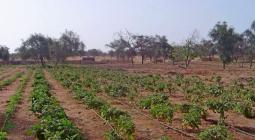Congo Basin: a call from the OIF for sustainable agriculture based on innovation

The Organisation internationale de la francophonie (OIF) is seeking to catalyse eco-innovation by supporting innovations likely to strengthen sustainable agriculture in the Congo Basin, which is under threat from industrial agriculture in particular. Interested companies, universities, organisations and local authorities must submit their initiatives by 29 April 2024 at the latest.
Spanning six countries – Cameroon, Central African Republic (CAR), Democratic Republic of Congo (DRC), Congo, Equatorial Guinea and Gabon – the Congo Basin is the second largest tropical forest after the Amazon rainforest. It is at the heart of a call for innovations recently launched by the Organisation internationale de la francophonie (OIF), because it is under major threat from mining, oil and gas exploitation, as well as industrial agriculture.
As part of this call for applications, the international organisation will mainly be supporting the creation of living laboratories for eco-innovation, with the aim of shaping a sustainable agricultural landscape in this region in the heart of Africa, in particular by developing innovative and sustainable solutions to environmental and social challenges.
In the Congo Basin (covering an area of 3.7 million km2), the planting of palm oil and other commercial farms is one of the main causes of deforestation, according to the World Wildlife Fund (WWF). One example is the Camvert project in southern Cameroon. This project to develop the largest palm grove in Central Africa is set to swallow up 50,000 hectares of forest, the equivalent of three times the size of Cameroon’s capital, Yaoundé.
The call for innovations, which closes on 29 April 2024, is open to companies, organisations, local authorities and academic institutions involved in eco-innovation in the six countries of the Congo Basin. “Successful applicants will receive technical and financial support,” says the OIF, which is implementing this sustainable agriculture project as part of its 2024-2027 programming for sustainable development.
Cover photo: By AFRIK21









